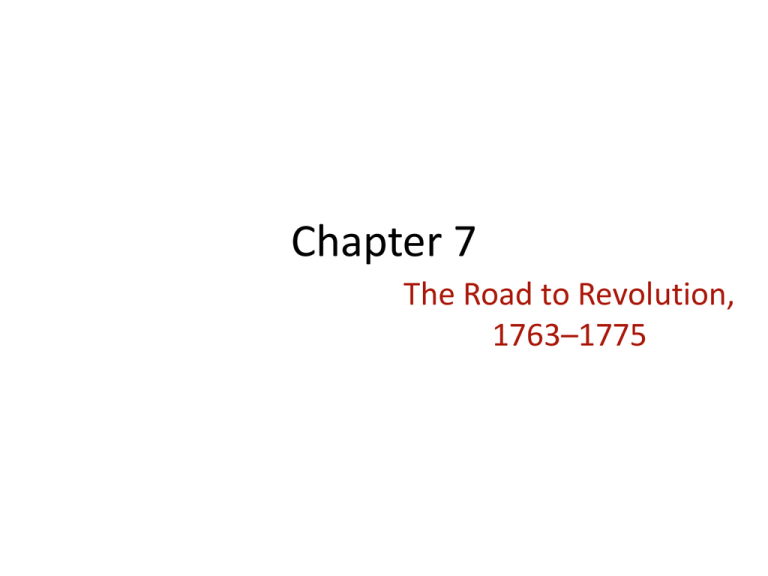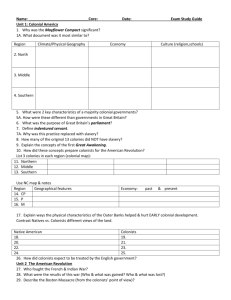APUS Unit 3 Ch.7 Road to Revolution PPT0
advertisement

Chapter 7 The Road to Revolution, 1763–1775 p130 Consequences of the French and Indian War • • • • Colonial self-esteem raised Colonists received military experience British no longer seemed invincible Tensions developed between British officers and colonists. Colonists were looked upon with contempt • British officials were upset that colonists did not fully support the common cause • War did encourage some colonial unity • French and Spanish threat to the colonies was eliminated/reduced • Native Americans lost the ability to play off the European powers against each other • Colonists had a new sense of destiny as a growing people with a continent open before them Ways to Think about the “Revolution” • The War for Independence (1775-1783) • The period from 1763 to 1783 • The period from 1763 to the writing of the Constitution • What about the period 1754-1800? Some Themes • Home rule and who would rule at home • The Revolution as a conservative movement (protecting existing liberties and rights and maintaining the existing social structure/way of life) • The Revolution as a radical democratic movement from below (colonial elites sought to harness a movement that potentially threatened their rule as well as that of England) More Themes • Tensions between western settlers and established east coast elite – Bacon’s Rebellion (1676)- Virginia – Paxton Boys (1763-1764)- Pennsylvania – Regulator Movement (1765-1771)- N. Carolina • Taxation – Regulation of trade v. raising revenue – Direct v. virtual representation Historiography • • • • Progressive Consensus Neo-progressive Gordon Wood Progressive • Charles Beard An Economic Interpretation of the Constitution of the United States, published in 1913 – economic interests were at the heart of the revolution Conservative • consensus around shared values (such as republicanism); emphasizes the conservative nature of the Revolution Ideological basis for revolution • Bernard Bailyn The Ideological Origins of the American Revolution (1967) Neo-progressive • Gary Nash The Urban Crucible – socio-economic conditions resulted in the political radicalization of the urban lower working classes • Gordon Wood The Creation of the American Republic, 1776-1787 – -Americans developed an entirely new conception of politics that was the product of a democratic society. This was an evolving concept that could be continuously refined and improved. (It was a genuinely radical event, which led to the breakdown of such long-standing patterns of society as deference, patriarchy, and traditional gender relations. Class conflict and radical goals may not have caused the Revolution; but the Revolution had a profound, even radical, ideological impact on society nevertheless.) Proclamation of 1763 • Passed after Pontiac’s Rebellion • Attempt to stabilize frontier and prevent further hostilities between Indians and colonists • Prevented colonial expansion west of the Appalachians • Colonists were angered and basically ignored it Mercantilism • 17th and 18th centuries • Trade, colonies and the accumulation of wealth as the basis for a country’s power • During 17th century, Navigation Acts were only loosely enforces (period of salutary neglect) • This changes after the French and Indian War Action and Reaction • Britain wanted colonies to contribute to costs of protecting the empire • 1764 Sugar Act • Quartering Act (1765) – (more British soldiers are stationed in the colonies after the French and Indian War) Stamp Act • 1765 • Revenue stamps required to be place on most printed paper • To be paid directly by the people who used the goods • Colonists believed their rights (including the right not to be taxed without representation) were being threatened • Nine colonies sent delegates to Stamp Act Congress • Sons and Daughters of Liberty formed • Boycotts were used effectively p118 • 1766 Stamp Act repealed but Parliament passed the Declaratory Act which asserted its right to tax and make laws for the colonies “in all cases whatsoever.” • 1767 Townshend Acts – Duties on tea, glass, and paper – Paid to crown officials (so they would no longer be dependent upon colonial assemblies) – NY’s assembly suspended for defiance of the Quartering Act • Repealed 1770 Letters From a Farmer in Pennsylvania John Dickinson • But whoever seriously considers the matter, must perceive that a dreadful stroke is aimed at the liberty of these colonies. I say, of these colonies; for the cause of one is the cause of all. If the parliament may lawfully deprive New York of any of her rights, it may deprive any, or all the other colonies of their rights; and nothing can possibly so much encourage such attempts, as a mutual inattention to the interests of each other. To divide, and thus to destroy, is the first political maxim in attacking those, who are powerful by their union. Boston Massacre • March 1770 • British soldiers in Boston to protect customs officials • 5 killed p119 p119 Boston Tea Party • England maintained a small tax on tea • 1773 British East India Company given a monopoly (tea was still cheaper) • December- dumped tea into the Boston harbor p121 Intolerable Acts • 1774 • Response to the Boston Tea Party • Coercive Acts – Port of Boston closed – Massachusetts legislature limited – Royal officials accuse of crimes could be tried in Great Britain – Quartering Act expanded to all colonies • Quebec Act (made Catholicism the official religion in Canada and extended its borders to the Ohio River) Map 7-1 p123 Rights and Liberties What are the rights and liberties that the colonists feel are being infringed upon? Declaration and Resolves • Issued by the First Continental Congress • October 14, 1774 • July 1775, Congress adopted Olive Branch Petition: – professed loyalty to crown and begged king to prevent further hostilities • King George III slammed door on all hope of reconciliation: – August 1775 he proclaimed colonies in rebellion – skirmishes were now treason, a hanging crime • Loyalty to the empire was deeply ingrained: – Americans continued to believe they were part of a transatlantic community – Colonial unity was weak – Open rebellion was dangerous – As late as January 1776, the king’s health was being toasted—“God save the king” • Gradually colonists were shocked into recognizing necessity to separate.







